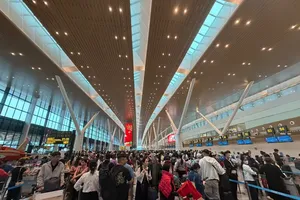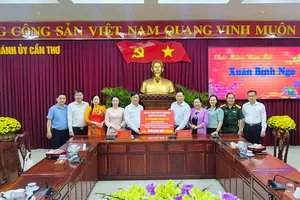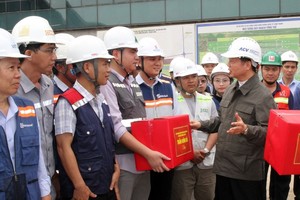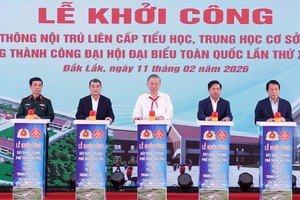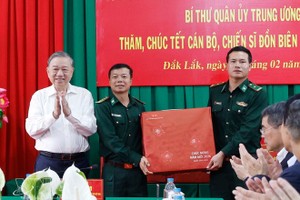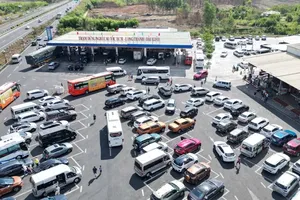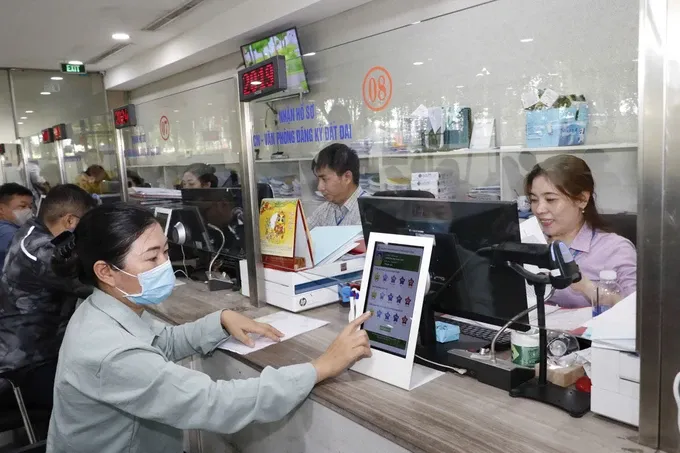
In his speech yesterday at the group discussion of the 9th extraordinary session of the 15th National Assembly (NA), General Secretary To Lam emphasized the opportune moment for implementing organizational reforms, citing the potential to achieve targeted outcomes, including economic growth and improved living standards.
The streamlining initiative has garnered broad public and institutional support, reflecting a widely held desire for a more efficient and effective government.
General Secretary To Lam identified two paramount objectives, namely economic growth and enhanced quality of life. He stressed the need for a streamlined, high-performing apparatus with clearly defined roles and responsibilities. Achieving this requires a well-defined organizational model, a supportive legal framework, and capable personnel to ensure effective implementation.
He further underscored the importance of aligning the apparatus with the specific needs of the NA, the Government, ministries, and localities, while also considering coordination mechanisms, data management capabilities, policy implementation capacity, organizational quality, and budgetary oversight. Regular performance evaluations of the State apparatus are also deemed essential.
According to Head Le Minh Hung of the Central Organization Commission, the nation is undertaking a significant effort to revolutionize the organizational structure of the political system.
The swift consensus achieved on the summary of Resolution 18’s implementation only after two months of the launch underscores the accuracy of the Central Committee’s decisions, which are grounded in scientific, practical, legal, and political foundations. While challenges have arisen during this rapid process, the Central Committee has pledged to address and resolve them.
This 9th extraordinary session of the 15th NA aims to refine the legal framework, ensuring a smooth transition to the new organizational structure. The revised regulations will facilitate continuous and efficient operation, preventing any disruption.
Following the streamlining process, the Politburo revised Directive 35, laying the groundwork for upcoming Party congresses at all levels. Beyond policy adjustments, local authorities must implement mechanisms to retain skilled and experienced personnel, balancing the need for streamlining with the retention of valuable human capital.
General Secretary To Lam has consistently emphasized the need for a comprehensive review and revision of the legal framework to complement the proposed organizational changes. He restated the principle of assigning multiple tasks to a single agency where appropriate, and ensuring clear accountability for each assigned task. Organizational reform must be aligned with broader initiatives to reform Party leadership methods and empower local authorities.
Dr. Tran Thi Thu Ha from HCMC University of Law, citing international experience, suggests that administrative reform should begin with the government apparatus, specifically by reducing the number of ministries.
Assoc. Prof. Dr. Le Minh Thong, former Assistant to the NA Chairman, advocates for identifying, nurturing, and utilizing talents, including non-Party members, in leadership positions within the state apparatus and socio-political organizations. He emphasizes the importance of placing citizens at the center of all state activities, ensuring that the entire state apparatus is organized on the principle of serving the people.
Prime Minister Pham Minh Chinh described the current initiative as a revolution in organization and structure, aiming for a streamlined, effective, and efficient apparatus, with a focus on staff reduction, restructuring, and improved quality of civil servants.
This major Party guideline aims for completion in February 2025, allowing for implementation in March 2025, in preparation for Party congresses. The Prime Minister acknowledged the potential for both smooth transitions and unforeseen challenges, pledging to address any difficulties that may arise.
He stressed the importance of clearly defined roles and responsibilities, assigning tasks to the most qualified individuals, and delineating the functions of the legislative, executive, and judicial branches. He also advocated for decentralization and empowerment, coupled with resource allocation, enhanced implementation capacity, and rigorous oversight. He emphasized local autonomy and accountability, reduced administrative burdens, and a practical, evidence-based approach to problem-solving.
National Assembly Chairman Tran Thanh Man highlighted the strong public and institutional support for this initiative. He stressed that streamlining must be accompanied by the selection of highly qualified individuals dedicated to serving the nation.
Standing Deputy Prime Minister Nguyen Hoa Binh noted that the current budget allocation, with 70 percent dedicated to recurrent expenditures, necessitates streamlining. He argued that a more efficient apparatus to use less state budget is crucial for freeing up resources for socio-economic development, national defense, and improved living standards. He also emphasized the need for a suitable legal framework to support effective streamlining.
Dr. Pham Van Quoc from Nguyen Hue University (Ministry of National Defence) argued that effective streamlining requires maximum decentralization and empowerment, stipulated in revised legislation. He emphasized local autonomy and accountability.
Decentralization must be commensurate with the conditions, management proficiency, and capacity of corresponding local levels, ensuring the principle of efficacy. Responsibility for any given task should be delegated to the level of government best positioned to understand the specific context, provide timely solutions, and effectively address the needs of organizations and citizens.
Prof. Dr. Nguyen Quoc Suu from the National Academy of Public Administration identified institutional reform as a key pillar of sustainable socio-economic development. He suggested a supplementary model of decentralization, allowing local governments to formulate policies while receiving central support when needed, fostering both local development and capacity building.




